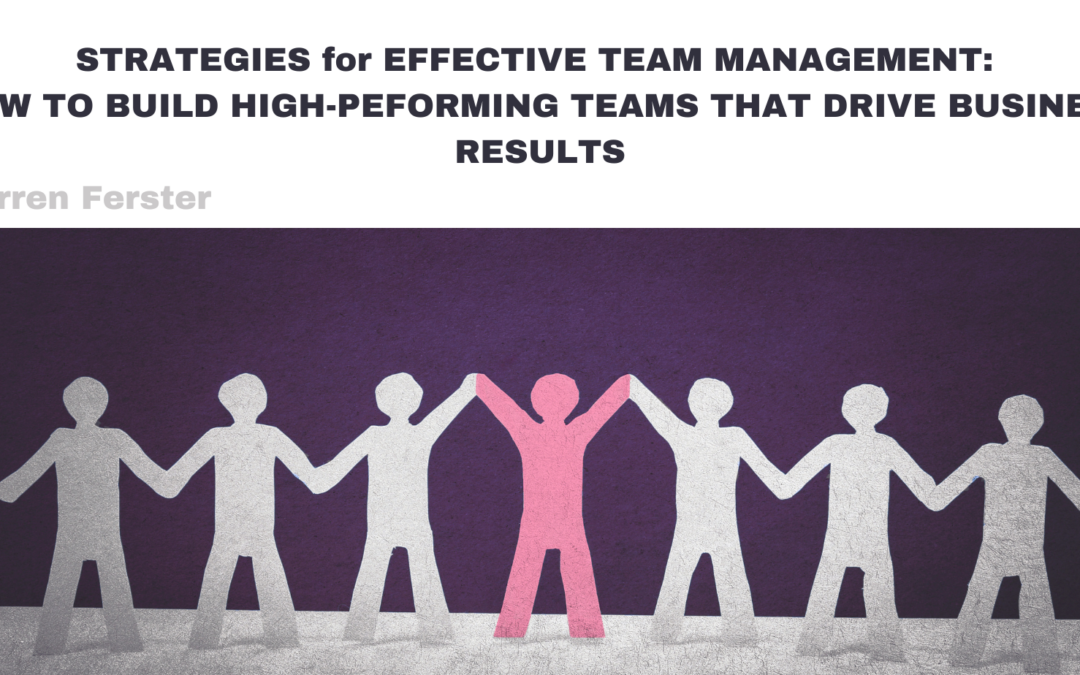Effective team management is essential for organizations striving for success. A high-performing team can achieve remarkable results, surpassing individual efforts. In this blog, we will explore proven strategies for building and managing teams that consistently drive business outcomes. By implementing these strategies, leaders can foster collaboration, motivation, and productivity within their teams.
- Define Clear Goals and Expectations:
To build a high-performing team, it is crucial to establish clear goals and expectations. Team members should maintain a shared understanding of the team’s purpose, objectives, and key performance indicators. Clearly define roles, responsibilities, and performance metrics for each team member. By setting specific, measurable, attainable, relevant, and time-bound (SMART) goals, team members can align their efforts and focus on achieving tangible outcomes.
- Foster Open Communication:
Open and effective communication is the cornerstone of successful team management. Encourage open dialogue and active listening among team members. Create a safe and inclusive environment where ideas and feedback are welcomed. Regularly communicate updates, provide constructive feedback, and celebrate achievements. By promoting transparent communication channels, teams can enhance collaboration, resolve conflicts, and foster a culture of trust and respect.
- Build a Diverse and Complementary Team:
Diversity in skills, backgrounds, and perspectives can enrich team dynamics and problem-solving capabilities. When forming teams, consider individuals with diverse expertise and strengths that complement each other. Encourage collaboration and knowledge sharing among teams, as this can lead to innovative solutions and improved decision-making. Embrace diversity as a catalyst for creativity and adaptability, resulting in enhanced business outcomes.
- Encourage Continuous Learning and Development:
Investing in the growth and development of team members is vital for their engagement and long-term success. Support ongoing learning opportunities, such as training programs, workshops, and mentoring. Encourage individuals to acquire new skills, expand their knowledge, and stay updated with industry trends. By fostering a learning culture, teams can adapt to evolving challenges, seize new opportunities, and contribute to the organization’s overall growth.
- Empower and Delegate:
Effective team management involves empowering team members and delegating responsibilities appropriately. Recognize individual strengths and provide autonomy within defined boundaries. Delegate tasks based on team members’ expertise, interests, and development goals. Empowered team members are more engaged, take ownership of their work, and demonstrate accountability. The approach fosters ownership and increases overall team productivity.
- Foster Collaboration and Teamwork:
Building a collaborative work environment is crucial for high-performing teams. Encourage cross-functional collaboration, knowledge sharing, and teamwork. Foster a sense of collective responsibility, where team members support and complement each other’s efforts. Utilize tools and technologies that facilitate collaboration and streamline communication. By leveraging collective intelligence, teams can solve complex problems more efficiently and drive better results.
- Recognize and Reward Performance:
Acknowledging and celebrating individual and team achievements is vital for maintaining motivation and engagement. Implement a recognition and reward system that aligns with the team’s goals and values. Regularly provide constructive feedback and publicly recognize exceptional performance. Celebrate milestones, both big and small, to foster a positive work environment and boost morale. A culture of appreciation motivates team members to strive for excellence and fuels their commitment to achieving business results.
Effective team management is a key driver of business success. By implementing these strategies – defining clear goals, fostering open communication, building a diverse team, encouraging continuous learning, empowering team members, fostering collaboration, and recognizing performance – leaders can build high-performing teams that consistently drive business results. Remember, a well-managed team is greater than the sum of its parts and has the potential to achieve extraordinary outcomes.

